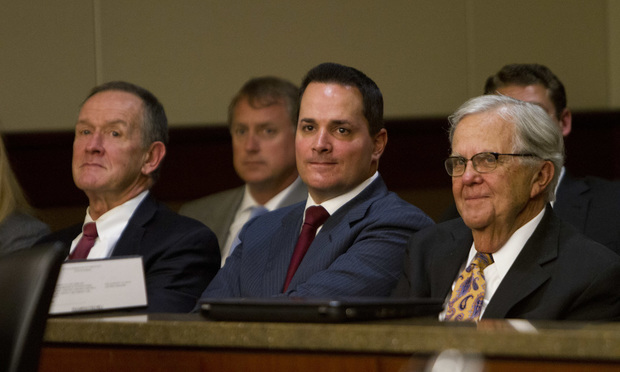Appeals Court OK's Racketeering Claims Against Lawyers in Waffle House Sex Tape Case
In their dissents, two judges said the claims against the lawyers must be dismissed.
March 19, 2019 at 02:30 PM
6 minute read
 The lawyers being sued for alleged extortion—John Butters (from left), David Cohen and Hylton Dupree Jr.— watch the proceedings. (Photo: John Disney/ALM)
The lawyers being sued for alleged extortion—John Butters (from left), David Cohen and Hylton Dupree Jr.— watch the proceedings. (Photo: John Disney/ALM)
The Georgia Court of Appeals on Monday issued an omnibus ruling greenlighting civil racketeering litigation against three lawyers who sought millions of dollars from the chairman of the Waffle House restaurant chain to settle harassment claims made by his housekeeper in a long-running legal brawl over a secret sex tape.
In a 7-2 ruling written by Judge Amanda Mercier, the state appellate court addressed four pending appeals stemming from Waffle House Chairman Joe Rogers' racketeering and invasion of privacy lawsuit against Atlanta attorney David Cohen of the Complex Law Group, Marietta attorney and former Cobb County prosecutor John Butters, and Hylton Dupree Jr. of Marietta's Dupree & Kimbrough. All three attorneys represented Rogers' former longtime housekeeper Mye Brindle.
Presiding Judges Christopher McFadden and Anne Barnes filed dissents, arguing that the claims against the lawyers must be dismissed.
The ruling—and the dissents—largely track an earlier decision the appeals court handed down before Cohen, Butters and Brindle went to trial last year on a charge of violating the state's eavesdropping law by secretly recording the sex tape. The tape, which Brindle made in 2012 and was shown to the jury, depicted her manually servicing a naked Rogers in the bedroom of his home, where Brindle was employed at the time.
Brindle made the recording after consulting with Cohen and Butters regarding a potential sexual harassment claim against Rogers, according to court papers and testimony in the criminal case.
The appellate court revisited its earlier ruling after Cohen, Butters and Brindle were acquitted.
The greenlighted suit claims that the sex tape was the product of a racketeering conspiracy that included an extortion scheme. It contends that Brindle and her lawyers violated Rogers' right to privacy when they worked “in concert” to produce the videotape.
Rogers also claims the recording violated the state's eavesdropping law, which makes it illegal for anyone to record “[a]ny person, through the use of any device without the consent of all persons observed, to observe, photograph, or record the activities of another which occur in any private place and out of public view.”
The suit also claims that a harsh demand letter from Cohen revealing the tape's existence and intimating that any publicity associated with potential litigation could be ruinous to Rogers was an attempt to extort money from him. Brindle's lawyers eventually suggested in preliminary settlement talks that Rogers pay her $12 million to quietly settle the case, according to court papers.
Rogers' suit is pending in Cobb County, where a trial judge allowed the majority of Rogers' claims against Cohen and Butters to stand but dismissed the bulk of the claims against Dupree. The appeals court largely affirmed the trial court's ruling regarding Cohen and Butters and restored all but one of Rogers' claims against Dupree.
The appellate court also threw out arguments by Brindle's lawyers that Rogers' suit was a Strategic Lawsuit Against Public Participation, or SLAPP, suit barred by state law.
The majority held that “the right to speak freely or petition the government” that the state's anti-SLAPP law was intended to protect “does not authorize an individual to illegally record another person or to arrange for an illegal recording to be made.”
“Similarly, Rogers's extortion allegations do not involve protected conduct,” Mercier wrote. “According to Rogers, Dupree and the other defendants conspired to extort money from him via the July 2012 demand letter. A demand letter that merely threatens a lawsuit generally enjoys First Amendment protection and will not support an extortion claim.”
But, she continued, Rogers' suit asserts “claims based on a purported illegal scheme to video-record his private activities and extort money from him in connection with those activities. As alleged, the acts underlying this scheme are not protected by the First Amendment or the anti-SLAPP statute.”
“We express no opinion on the merit of Rogers's claims against Dupree or the other defendants,” Mercier added.
The appeals court also rejected the lawyers' claims that the federal Noerr-Pennington doctrine—which safeguards a party's First Amendment right to petition the government for redress of grievances—similarly shielded them from Rogers' litigation claims.
“Rogers alleged that the litigation activity engaged in by the defendants was frivolous, grounded in false claims, and part of an extortion scheme,” Mercier wrote. “Accordingly, because he pleaded sufficient facts to suggest that the defendants' activities fell within the 'sham exception' to the Noerr-Pennington doctrine, the trial court properly denied the motion to dismiss.”
The appeals court dismissed just one of Rogers' privacy claims, which stemmed from a separate lawsuit Brindle filed in Fulton County disclosing her sexual encounters with Roger, ruling that the lawyers' conduct in that instance “relates entirely to the defendants' initiation, continuation, and procurement of litigation against Rogers on behalf of Brindle.”
In her dissent, Barnes argued that all of Rogers' claims should have been dismissed “because Rogers seeks damages solely for conduct of counsel undertaken as part of the initiation, continuation, and procurement of civil proceedings on their client's behalf.”
“All of the misconduct alleged to have been committed by Brindle's attorneys occurred in the course of their representation of Brindle on her sexual harassment claim,” she said.
Barnes also said the allegations should have been handled instead as an abusive litigation claim.
McFadden agreed with Barnes except for Rogers' allegation that the lawyers engaged in illegal eavesdropping. “Rogers alleged in his complaint that the threatened litigation was false and frivolous,” McFadden said. “But in construing the complaint in the context of a motion to dismiss, we are required only to accept as true Rogers' well pleaded facts.”
“Rogers does not dispute that he engaged in sexual activity with a person in his employment,” McFadden continued. “His allegation that this activity did not rise to the level of sexual harassment is a legal conclusion. For these reasons the complaint must be dismissed ”
On Monday, John Floyd of Atlanta's Bondurant, Mixson & Elmore—who represents Cohen and Butters—said the pending case “presents crucial constitutional and statutory questions concerning the ability of individuals to seek redress from the courts and attorneys to represent them in that process. We are reviewing our next steps at this time.”
Dupree's attorney, Thomas Cauthorn of Marietta's Cauthorn Nohr & Owens, was not available for comment.
But Rogers' attorney, William Hill of the Atlanta offices of Polsinelli, said, “What the opinion tells me is that, simply because you have a bar card, you do not have a license to violate the law.”
Hill filed the case in 2014, and the case is still in pretrial motions, he said.
This content has been archived. It is available through our partners, LexisNexis® and Bloomberg Law.
To view this content, please continue to their sites.
Not a Lexis Subscriber?
Subscribe Now
Not a Bloomberg Law Subscriber?
Subscribe Now
NOT FOR REPRINT
© 2025 ALM Global, LLC, All Rights Reserved. Request academic re-use from www.copyright.com. All other uses, submit a request to [email protected]. For more information visit Asset & Logo Licensing.
You Might Like
View All
12-Partner Team 'Surprises' Atlanta Firm’s Leaders With Exit to Launch New Reed Smith Office
4 minute read
After Breakaway From FisherBroyles, Pierson Ferdinand Bills $75M in First Year
5 minute read
On The Move: Freeman Mathis & Gary Adds Florida Partners, Employment Pro Joins Jackson Lewis
6 minute read
Veteran Litigators Move From Sidley Austin to Alston & Bird's New Chicago Office
3 minute readTrending Stories
- 1'A Death Sentence for TikTok'?: Litigators and Experts Weigh Impact of Potential Ban on Creators and Data Privacy
- 2Bribery Case Against Former Lt. Gov. Brian Benjamin Is Dropped
- 3‘Extremely Disturbing’: AI Firms Face Class Action by ‘Taskers’ Exposed to Traumatic Content
- 4State Appeals Court Revives BraunHagey Lawsuit Alleging $4.2M Unlawful Wire to China
- 5Invoking Trump, AG Bonta Reminds Lawyers of Duties to Noncitizens in Plea Dealing
Who Got The Work
J. Brugh Lower of Gibbons has entered an appearance for industrial equipment supplier Devco Corporation in a pending trademark infringement lawsuit. The suit, accusing the defendant of selling knock-off Graco products, was filed Dec. 18 in New Jersey District Court by Rivkin Radler on behalf of Graco Inc. and Graco Minnesota. The case, assigned to U.S. District Judge Zahid N. Quraishi, is 3:24-cv-11294, Graco Inc. et al v. Devco Corporation.
Who Got The Work
Rebecca Maller-Stein and Kent A. Yalowitz of Arnold & Porter Kaye Scholer have entered their appearances for Hanaco Venture Capital and its executives, Lior Prosor and David Frankel, in a pending securities lawsuit. The action, filed on Dec. 24 in New York Southern District Court by Zell, Aron & Co. on behalf of Goldeneye Advisors, accuses the defendants of negligently and fraudulently managing the plaintiff's $1 million investment. The case, assigned to U.S. District Judge Vernon S. Broderick, is 1:24-cv-09918, Goldeneye Advisors, LLC v. Hanaco Venture Capital, Ltd. et al.
Who Got The Work
Attorneys from A&O Shearman has stepped in as defense counsel for Toronto-Dominion Bank and other defendants in a pending securities class action. The suit, filed Dec. 11 in New York Southern District Court by Bleichmar Fonti & Auld, accuses the defendants of concealing the bank's 'pervasive' deficiencies in regards to its compliance with the Bank Secrecy Act and the quality of its anti-money laundering controls. The case, assigned to U.S. District Judge Arun Subramanian, is 1:24-cv-09445, Gonzalez v. The Toronto-Dominion Bank et al.
Who Got The Work
Crown Castle International, a Pennsylvania company providing shared communications infrastructure, has turned to Luke D. Wolf of Gordon Rees Scully Mansukhani to fend off a pending breach-of-contract lawsuit. The court action, filed Nov. 25 in Michigan Eastern District Court by Hooper Hathaway PC on behalf of The Town Residences LLC, accuses Crown Castle of failing to transfer approximately $30,000 in utility payments from T-Mobile in breach of a roof-top lease and assignment agreement. The case, assigned to U.S. District Judge Susan K. Declercq, is 2:24-cv-13131, The Town Residences LLC v. T-Mobile US, Inc. et al.
Who Got The Work
Wilfred P. Coronato and Daniel M. Schwartz of McCarter & English have stepped in as defense counsel to Electrolux Home Products Inc. in a pending product liability lawsuit. The court action, filed Nov. 26 in New York Eastern District Court by Poulos Lopiccolo PC and Nagel Rice LLP on behalf of David Stern, alleges that the defendant's refrigerators’ drawers and shelving repeatedly break and fall apart within months after purchase. The case, assigned to U.S. District Judge Joan M. Azrack, is 2:24-cv-08204, Stern v. Electrolux Home Products, Inc.
Featured Firms
Law Offices of Gary Martin Hays & Associates, P.C.
(470) 294-1674
Law Offices of Mark E. Salomone
(857) 444-6468
Smith & Hassler
(713) 739-1250






